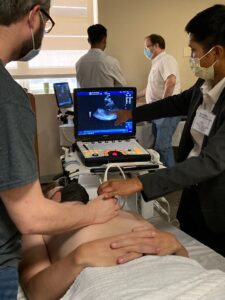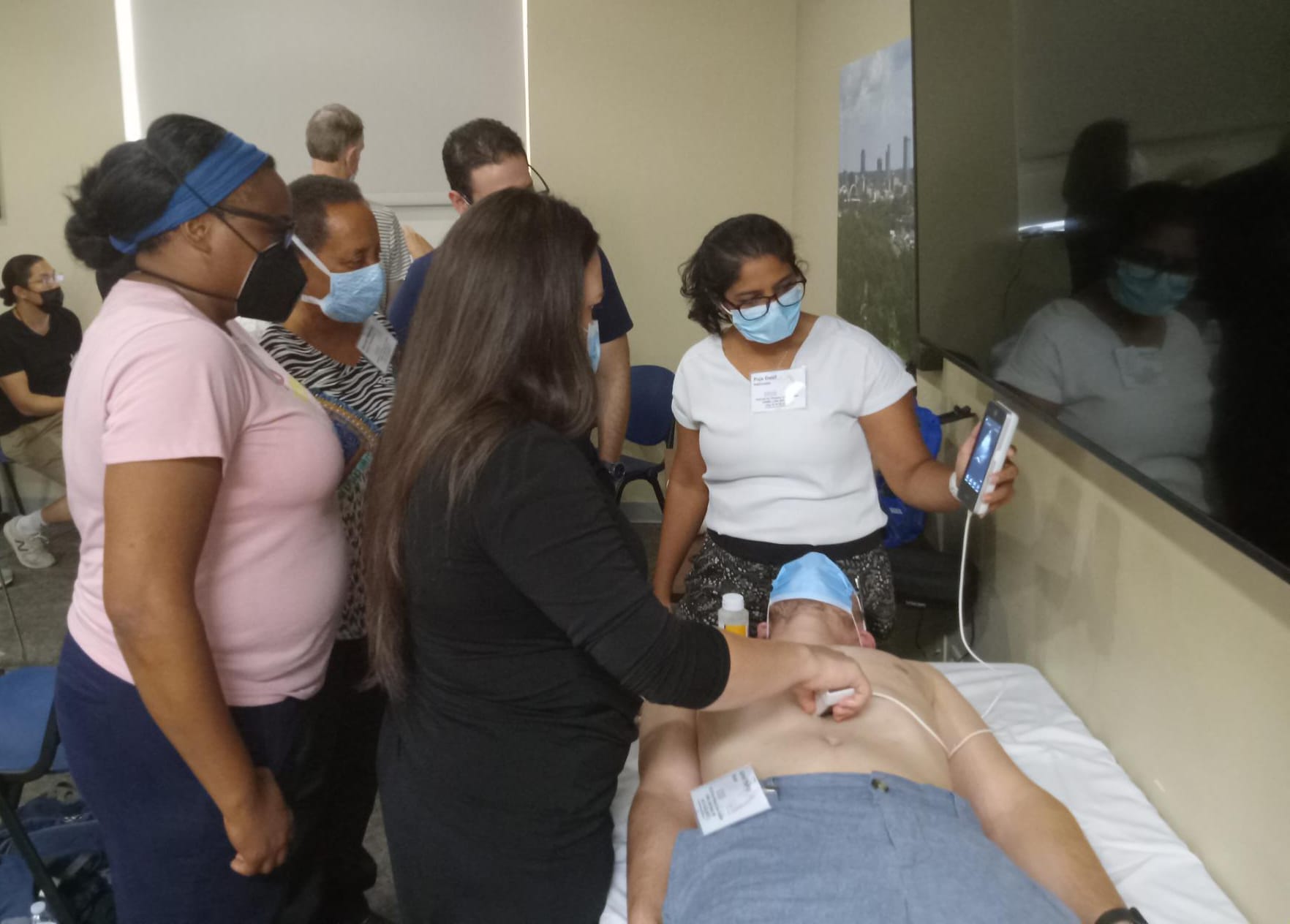UAMS Begins Training for Point-of-Care Ultrasound Program
| More than two dozen physicians from across the state gathered at the University of Arkansas for Medical Sciences (UAMS) Department of Family and Preventive Medicine in Little Rock for a training session that served as a first step in a program to expand the use of point-of-care ultrasound.
Point-of-care ultrasound is a tool that helps doctors diagnose their patients more efficiently, reducing the need for return visits. Ultrasound devices can be used in most medical settings, and they have the potential to improve diagnosis in rural areas that have less access to specialty care.

A student from the UAMS College of Medicine serves as a model patient during point-of-care ultrasound training.
“Expanding our use of ultrasound in the primary care setting can allow our physicians to make a more timely diagnosis of potentially serious health conditions,” said Leslie Stone, M.D., MPH, an assistant professor in the UAMS College of Medicine Department of Family and Preventive Medicine who treats patients at the Neighborhood Clinic on Capitol Mall in Little Rock. “It can also reduce the need to refer patients for more costly diagnostic imaging.”
During the two-day training session at UAMS, physicians learned about the many ways to use point-of-care ultrasound. While best known for its use in obstetrics, ultrasound can also detect gallbladder or pulmonary conditions, guide procedures such as joint injections and evaluate cardiac function. Nine students from the UAMS College of Medicine served as model patients as the physicians learned how to use the ultrasound devices.
“This hands-on training provided the opportunity to learn about ultrasound applications in primary care and gave attendees a chance to become more comfortable with integrating ultrasound into clinical practice,” said Stephen Foster, M.D., a family medicine physician at the UAMS Family Medical Center in Jonesboro.
Ultrasound devices are already in place at clinics in Batesville, Fayetteville, Fort Smith, Jonesboro, Little Rock, Pine Bluff and Texarkana. UAMS has seven cart-based machines and a number of portable, handheld scanners. For now, the ultrasound devices can only be used for educational purposes, but UAMS plans to eventually incorporate them into clinical practice.
UAMS is implementing its plan with the help of a grant from the Health Resources & Services Administration (HRSA) Medical Student Education program. The Global Ultrasound Institute, which led the training session, has been hired for a one-year consultancy to assist in the effort.
“Point-of-care ultrasound is transforming care by making it faster, safer and easier for patients to get an immediate evaluation with ultrasound performed by their doctors, nurses and physician assistants,” said Mena Ramos, M.D., co-founder of the Global Ultrasound Institute.
Fifteen primary care physicians have been selected for a yearlong fellowship through the Global Ultrasound Institute. Participants will receive one-on-one mentorship and training in ultrasound techniques, with a goal of earning credentials so they can train residents at their clinics. “The purpose of this fellowship is to increase the utilization of point-of-care ultrasound in primary care and expand POCUS training in medical school,” Foster said.
UAMS will work to formalize an ultrasound component for third- and fourth-year medical students during their family medicine rotations. “This will supplement and reinforce the point-of-care ultrasound techniques introduced during their first and second years of medical school,” Foster said.
The physicians who took part in the training session noted that the skills they learned will eventually improve their clinical practice. “This training will also help our physicians teach these skills to residents and medical students, preparing the next generation for what is quickly becoming the standard of care,” said Stone, who also is the director of the Division of Medical Student Education in the UAMS Department of Family and Preventive Medicine.
“It was a pleasure for our team to train family physicians from across the state,” Ramos said. “This cohort of physicians on the cutting edge of point-of-care ultrasound is laying the foundation for Arkansas to be a national leader for point-of-care ultrasound in primary care.”
This program is supported by the Health Resources and Services Administration of the U.S. Department of Health and Human Services as part of an award totaling $19,575,532, with 10% financed with nongovernmental sources. The contents are those of the author(s) and do not necessarily represent the official views, nor the endorsement, of HRSA, HHS or the U.S. government.
